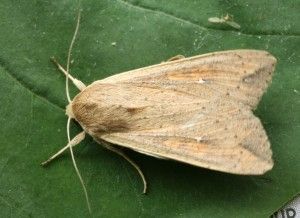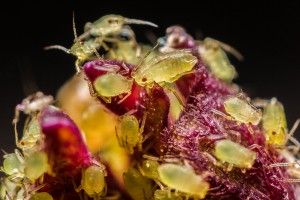Insects Are Less Randy in the Rain
Beetles, moths and aphids are markedly turned off by the hint of impending rain, likely an evolutionary adaptation to prevent them from getting washed away
/https://tf-cmsv2-smithsonianmag-media.s3.amazonaws.com/filer/8f/be/8fbeb539-6a94-42ce-bc01-9f9d58197d4a/rsz_beetle.jpg)
For some humans, storms–with their raging winds and rains, passionate bursts of lightening and bone-rattling thunder–are prompts for romantic snuggling up. Likewise, few can argue that kissing in the pouring rain, Hollywood-style, isn’t a pretty thrilling experience. Insects, however, beg to differ. For them, overcast skies are the ultimate sexual buzz kill.
To assess how big of a turn-off rain is for insects, a team of Brazilian and Canadian researchers gathered together collections of three versatile arthropods: curcurbit beetles, true armyworm moths and potato aphids. Insects, they knew, possess hairs and waxy coatings to help repel water, and some, like mosquitoes, are known to have no problem flying through raindrops. On the other hand, too much heavy rain and wind can kill the little guys. So when it came to the question of how their tiny research subjects would handle sex in a storm, the team wasn’t sure what to expect.
Storms form when different air pressures collide, and the researchers decided to use decreasing air pressure as a proxy for impending rain. The team wanted to examine changes in any insect mating behaviors, including courtship and the deed itself, so they performed a number of experiments, which they describe in a paper published in PLoS One.
First, they exposed around 70 male curcurbit beetles to virgin female sex pheromones–chemical odors that normally would drive the males into a frenzy of desire–while subjecting the bugs to different barometric pressures, including stable, increasing (usually associated with clear weather but strong winds) and decreasing atmospheric pressures. Under stable or increasing pressure, they found, the male beetles eagerly scuttled into the section of their container where the pheromone was concentrated. But when the pressure was decreasing, the males were significantly less enthusiastic about initiating a meeting with a potential blushing beetle bride. In fact, they usually ignored the cues.

Next, around 70 virgin armyworm moth females were plopped into a similar experimental setting. The moths were on the cusp of peak mating season, during which females “call” to males by releasing potent cocktails of sex pheromones. When the pressure dropped, the females apparently did not feel frisky, releasing significantly less of the come-hither concoctions than under the environment of stable or increasing pressure. In nature, the researchers point out, females usually chose a nice spot high on an extended leaf to do this–in other words, the spot most likely to be splattered with rain and result in their getting washed away.
The researchers then took the obvious next step, putting both beetle and moth males and virgin females together. The male moths seemed totally turned off by both the decreasing and increasing pressure, mating fewer times under those conditions than in the stable control group.
The male beetles behaved a bit more curiously, however. When pressure was normal or increasing, the male beetles took their time setting the mood and impressing their lucky ladies by intertwining their antenna and performing other sexy pre-copulation behaviors.
When the pressure was decreasing, however, the males were all business. They skipped courtship entirely, jumped on the females and quickly got things over and done with. The researchers found this to be a bit puzzling since the males did not respond to the female hormones under decreasing pressures, but did go ahead and initiate a quickie when females were standing right next to them. This rushed copulation could be because of a “perceived reduction in life expectancy”–in other words, an it’s-the-end-of-the-world-so-let’s-do-it mentality–although that would require further investigation, they say.

Finally, the potato aphids were subjected to similar experiments. The researchers observed that females raised their backsides and hind legs into the air (the aphid’s version of a “come and get it” calling) less often in both increasing and decreasing pressure conditions. Like the moths, the team points out, the females chose the edge of a leaf to perform this booty call, so any hint of wind could potentially spell disaster for them. As for the males, not surprisingly, they, too, had no success in mating under neither the increasing or decreasing pressure conditions, perhaps because they agree that literally getting blown away during copulation is not the way to go.
The evidence, the team writes, was pretty conclusive: insects are not turned on by storms. This applies to all facets of mating, including an aversion to seeking, encouraging or initiating sex when there’s even a chance that precipitation and wind might be involved.
Although each species had their kinks–the beetles would still do it, albeit quickly, and the moths and aphids hated both increasing and decreasing pressure–the team thinks the results are general enough and cover a diverse enough spread of species to likely apply to many insects. Probably, they write, this aversion evolved as a way to avoid injury, death by drowning or being swept away by strong winds.
While the team is eager to probe even more arthropod species to confirm and better understand these behavioral patterns, they conclude that insects, at least, seem unwilling to die for love.
/https://tf-cmsv2-smithsonianmag-media.s3.amazonaws.com/accounts/headshot/Rachel-Nuwer-240.jpg)
/https://tf-cmsv2-smithsonianmag-media.s3.amazonaws.com/accounts/headshot/Rachel-Nuwer-240.jpg)